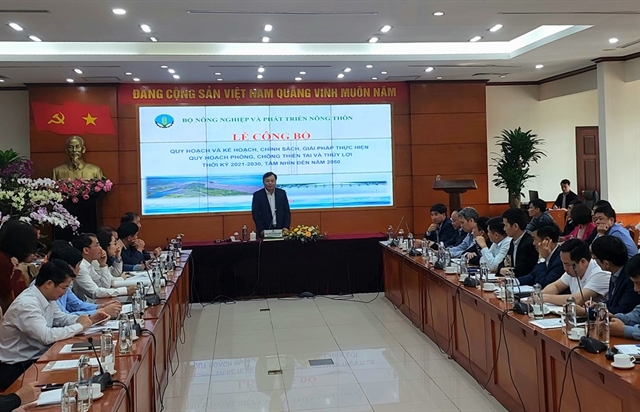 Society
Society


|
| At the meeting. VNA/VNS Photo |
HÀ NỘI During yesterday’s ceremony introducing the implementation plan for the Disaster Prevention and Irrigation Plan for 2021-2030 with a vision to 2050, Deputy Minister of Agriculture and Rural Development Nguyễn Hoàng Hiệp underscored irrigation's pivotal role as a fundamental national infrastructure.
He emphasised its essential contribution not only to agriculture but also to broader socio-economic growth, marking it as a cornerstone for Việt Nam's sustainable development.
The Prime Minister promulgated the Disaster Prevention and Irrigation Plan for 2021-2030, with a vision to 2050, through Decision 847/QD-TTg dated July 14, 2023. Its overarching objective is to secure water supply and drainage systems that support people's livelihoods, boost agricultural productivity, fuel various economic sectors and safeguard the environment.
Furthermore, this plan is committed to bolstering disaster prevention capabilities, mitigating the impact of natural disasters. This, in turn, is expected to contribute to the sustainable development of the socio-economic landscape, guarantee water security, foster adaptability to climate change, and promote development in the upper reaches of transboundary rivers.
To realise these goals, the Ministry of Agriculture and Rural Development has crafted and recommended a comprehensive implementation plan. This plan delineates specific tasks and solutions and outlines a roster of priority projects slated for execution.
Hiệp stated in order to transform these plans from paper to reality, ministry departments and local governments need to reevaluate existing policies and suggest innovative strategies concerning resources and manpower to the Government and National Assembly. This effort aims to address conflicts and facilitate the execution of plans. He also stressed the importance of coordinating and prioritising solutions to ensure effective implementation of plans.
Provinces and cities are encouraged to draw up strategies for resource mobilisation, advocating their Provincial People's Councils to allocate local budget resources within medium-term and annual public investment plans to kick-start and back projects aimed at bolstering local infrastructure. The goal is to foster cohesive and thorough investment efforts that significantly boost efficiency.
During the announcement event, participants emphasised the importance of proactive water resource management across different scenarios as essential for achieving swift and enduring socio-economic growth.
Trần Đình Hòa, Director of the Việt Nam Institute of Water Resources Science, highlighted the critical importance of managing, exploiting and utilising water resources for water security and its relevance across various fields and industries. He underscored the necessity for the Ministry of Agriculture and Rural Development to collaborate closely with other ministries, sectors and localities. Such cooperation aims to ensure a comprehensive and multipurpose approach to water resource management, exploitation and use. This collaborative effort is crucial for maximising the efficiency of the irrigation initiatives outlined in the planning. VNS




